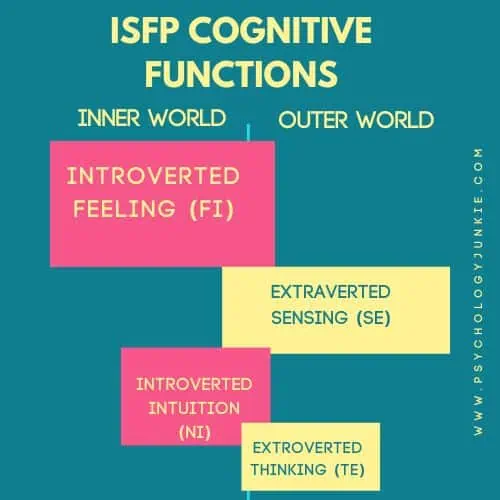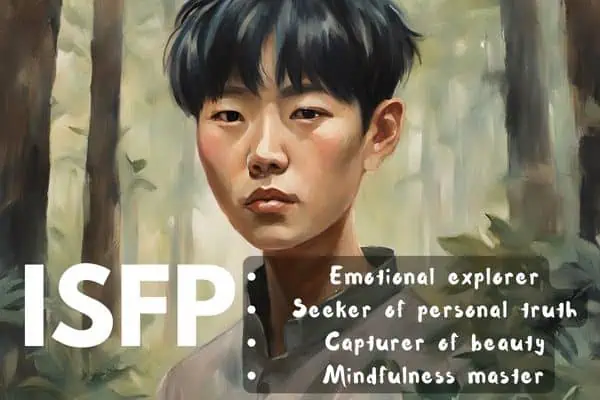Why ISFPs Struggle to Trust Their Intuition…and What to Do About It
You’ve felt it before. That whisper in your gut. A quiet nudge. A flicker of “something’s not right.”
But you shrugged it off. You didn’t have proof. And ISFPs? You’re not about to launch into a full-blown conspiracy theory based on a weird vibe.
…Until everything crashes and burns and you’re left thinking, “I knew this would happen.”

Or maybe the opposite: you did follow that gut feeling. You trusted your intuition—and it led you straight into a dumpster fire of a situation.
Welcome to the life of the ISFP intuitive experience. Yes, ISFPs do have intuition! Even though you’re a sensor, you have a strong connection to the abstract world as well.
This article is for you if:
- You often sense something’s “off” but feel crazy for not being able to explain it.
- You’ve made impulsive choices based on an internal hunch… and then second-guessed it for months.
- You want to understand when to listen to your instincts—and when your brain might just be doing interpretive dance in the dark.
Let’s dig into the beautiful mess that is ISFP intuition.
Not sure what your personality type is? Take our personality questionnaire here. Or you can take the official MBTI® here.
The Double-Edged Sword of Intuition (Ni in the Tertiary Position)

Introverted Intuition (Ni) is your third cognitive function. Cognitive functions are those mental tools that run in the background of your mind without you even realizing it. As an ISFP your top function is Introverted Feeling (“what matters to me?” “am I being authentic?” “what do I think is right or wrong?”). Extraverted Sensing provides backup (“What’s real and provable?” “What can I feel, taste, touch, hear right now?”) and Introverted Intuition is third. It’s not running the show, but it does sneak in with commentary when you least expect it. Think of it like a cryptic fortune teller in the back of your mind. Sometimes it’s eerily accurate. Other times it’s just bored and making stuff up.
For ISFPs, this function tends to show up in flashes. A sudden “aha.” A strange sense that something is going to go wrong—or right. A future scenario plays out in your mind before anything even happens in reality.
The problem? You don’t always know whether it’s a real insight… or just internal static. So you doubt it. Push it away. Rationalize it. Or you go all in and regret everything.
It doesn’t help that your dominant function, Introverted Feeling (Fi), is value-driven and personal. It’s not hyper-fixated on logic—it wants alignment with what feels right. Then your auxiliary function, Extraverted Sensing (Se), steps in like, “Let’s just do something NOW.”
So when Ni finally gets a word in, it’s often overruled by louder voices. Or it’s misunderstood. Or, in moments of chaos or stress, it suddenly becomes too loud and you jump to conclusions.
You might’ve said things like:
- “I had a feeling, but I couldn’t explain it… so I ignored it.”
- “I knew they were lying—I just didn’t want to believe it.”
- “I got this weird vibe and bailed… but maybe I overreacted?”
That’s the struggle. Tertiary Ni doesn’t always arrive with evidence or a clear message. It just drops hints. Subtle patterns. Gut reactions. And unless you’ve taken the time to learn its rhythm, it’s easy to either miss the memo—or mistake a random brain blip for divine revelation.
In other words: it’s a sword. But if you haven’t trained with it, you’ll either drop it or slice your own arm.
When Ni Overreaches (And You Trust It Too Much)
Let’s talk about the other side of the coin—the one where you do listen to your gut… and it steers you into a wall.
Because sometimes, your intuition isn’t some gentle inner warning. It’s a full-blown cinematic vision of the future. You “just know” how something is going to play out—and you act on that knowledge like you’re the Oracle of Delphi.
Only… you’re not.
This is the part where Ni starts grasping for patterns that aren’t actually there. It’s not trying to sabotage you—it’s just not fully developed yet. And it’s trying really hard to connect the dots using fragments of memory, feeling, and half-formed meaning.
Let’s say your friend doesn’t text back after three hours. Your gut starts spiraling.
“She’s mad. I must’ve offended her. She’s pulling away.”
But really? She just dropped her phone in the sink.
Or maybe you get a bad vibe at work. You’re sure your boss is planning to fire you, so you preemptively quit. Turns out they were about to offer you a promotion but were just… weirdly awkward about it.
This overconfidence in Ni usually happens when:
- You’ve had success trusting your gut before and now overestimate it.
- You’re stressed or overstimulated and your Fi-Se duo hands the mic to Ni, hoping it can make sense of the noise.
- You mistake discomfort for danger (very common if you’ve been burned before).
The tricky thing? Ni can feel like truth. There’s a reason it’s part of your function stack. And it’s powerful.
Your insights and gut hunches are important to pay attention to!
But if you’re not slowing down to cross-check with Se (What’s actually happening right now?) or Fi (Is this true to what I value and know?), you might start following Ni like it’s gospel.
And sometimes, it leads you into a place your actual self would never want to be.
Why ISFPs Struggle to Trust Their Gut in the First Place
You’d think with all the poetic gut feelings and inner nudges ISFPs experience, trusting your intuition would be second nature.
But it’s not.
Not consistently, anyway. Sometimes your instincts feel razor-sharp. Other times they vanish completely. Or worse—they whisper something important and you second-guess them until it’s too late.
Why does this happen?
- Your Stack’s Natural Priorities
Your dominant and auxiliary functions—Introverted Feeling (Fi) and Extraverted Sensing (Se)—are doing most of the heavy lifting. Fi is busy scanning your inner values: Does this feel right? Do I believe in this? Is this authentic? Meanwhile, Se is tuned into the external world: what you can see, taste, touch, and act on right now.
Ni, your intuition function, doesn’t really like all that noise. It prefers stillness. It wants to simmer in quiet patterns and long-range visions. So unless you’ve intentionally made space for it, Ni can feel like a neglected houseplant—wilting in the background and occasionally throwing a leaf in your face.
- Se Floods the System
Your Se is fast. It reacts. It wants to do, experience, respond. And it’s amazing for living in the moment. But that same real-time speed can drown out Ni’s quieter signals. You might sense something important internally… and then get pulled right back into whatever’s exciting or urgent.
It’s like trying to hear a whisper in the middle of a concert. The intuition is there—but you can’t always hear it over the bass line of the present moment.
- Childhood Gaslighting or Dismissal
Maybe you grew up with people who rolled their eyes at your instincts. You shared a gut feeling and were told, “You’re overreacting.” Or you called out a lie and got punished for it. When that happens enough, you start treating your inner voice like it’s untrustworthy—even when it’s not. - You’re Not Te-Backed
Unlike INTJS who pair Ni with Thinking (Te), your version of Ni doesn’t come with an attached logical explanation. Your inferior function is Extraverted Thinking (Te), which can leave you floundering when someone asks, “Why do you feel that way?” You may have no idea—just a hazy, abstract sense that something’s off.
And that can feel frustrating. You know something is wrong, but you can’t argue your case. So instead of standing by your gut, you second-guess it… or let someone else talk you out of it.
Bottom line:
You’re not broken. Your intuition isn’t weak. It’s just not your first or second tool—and it doesn’t always play by the rules of logic or immediate reality. Learning how to listen to it means slowing down, honoring its voice, and not expecting it to come with a PowerPoint.
What Healthy Intuition Looks Like for ISFPs

Let’s imagine a version of you where your intuition doesn’t feel like a glitchy fortune cookie. It doesn’t come in too late or shout “fire!” when there’s just a candle. It just… works—like a quiet companion offering insight at the right time, in the right way.
That’s what happens when your Ni is healthy and integrated. Not perfect. Not omniscient. Just part of your inner team instead of locked in the break room.
So what does that actually look like?
You pause before reacting.
Instead of jumping into action the second something feels wrong, you slow down and listen. You let that intuitive whisper stretch out a bit—see if it forms a full picture instead of just a gut jolt.
You notice patterns forming—without obsessing over them.
Healthy Ni in an ISFP picks up on vibes, subtext, emotional undercurrents. But instead of spiraling into “They probably hate me,” you observe: “Something feels different here. Let’s pay attention.”
You don’t need instant clarity.
This is a big one. Immature Ni wants certainty now—and if it can’t get it, it fills in the blanks with worst-case scenarios. But healthy Ni can sit with ambiguity. You start trusting that clarity will come—even if it’s not immediate.
You ground your hunches in reality.
You don’t throw your intuition out the window when it doesn’t come with a reason. But you also don’t treat it like prophecy. You check it against your Se: What’s actually happening right now? What’s the evidence? You check it against your Fi: Does this align with my values and what I know about myself and others?
You forgive your intuition for being messy.
Sometimes you’re going to be wrong. That doesn’t mean Ni failed—it means you’re human. Even INFJs and INTJs who have dominant Introverted Intuition are wrong plenty of times (thought they may not like to admit it).
Healthy intuition isn’t about being psychic. It’s about being attuned. Being open. Being willing to see the quiet patterns without demanding a loud answer.
When your Ni is working in harmony with your Fi and Se, it complements everything about you. It deepens your experiences. It gives you the ability to sense where things are going—without losing touch with where you are. It brings joy and meaning to things like spirituality, nature, dreams, and those imaginative musings that play across your mind right before you fall asleep at night.
It becomes less of a riddle… and more of a rhythm.
How to Strengthen and Trust Your Intuition (Without Letting It Hijack You)
If you’ve ever felt like your intuition is either MIA or steering the car off a cliff, you’re not alone. Developing a trustworthy gut instinct—especially when it’s hanging out in the third-function slot—isn’t about forcing it to be “right.” It’s about learning how to listen and filter what it’s telling you.
Here’s how to start doing that—without letting your inner mystic get drunk on power.
1. Journal Your Hunches
Write down your gut feelings before you know the outcome.
Not to prove yourself wrong or right—but to start spotting patterns. Over time, you’ll start noticing when your intuition tends to be spot-on (like when it involves people’s motives) and when it tends to panic over nothing (like when you’re tired and hangry).
Bonus: You get better at recognizing what’s an actual Ni whisper vs. a random emotional swirl from Fi or a stress-induced Se overload.
2. Slow Down Before You React
Your Se wants to move. Your Ni needs time to sift.
Next time you get a strong gut hit, take a breath. Don’t text them back yet. Don’t quit the job. Don’t cut your bangs at 2 a.m.
Ask:
- What exactly am I feeling?
- Is this a pattern I’ve seen before—or a story I’m telling myself?
- Have I taken in all the info… or just the part that matches the vibe I’m stuck on?
3. Create Stillness
Ni can have a paranoid streak at times, particularly when it’s in the tertiary position. And it’s going to get that way while you’re scrolling TikTok or dodging errands with five tabs open.
Take some time—walk alone, stare at a tree, sit in the bath. Not to force an answer. Just to make space for one. Intuition does its best work in the pauses. Not when it’s overloaded by doomscrolling or over-stimulating panic stories on the news.
4. Check in With Your Other Functions
Ni can get dramatic if it’s operating solo.
Balance it with Se (What are the facts I can observe right now?) and Fi (Is this gut feeling tied to a personal value—or a fear of being misunderstood, rejected, etc.?).
You’re at your best when your functions are working together—not when Ni’s doing improv without a script.
5. Talk to Someone You Trust
Not someone who will override your instincts or tell you what to do—someone who gets you.
Fi-Ni can become a feedback loop that spins too far inward. Sometimes saying your hunch out loud is all it takes to realize, “Okay, that’s probably a real thing,” or “Wow, I’ve created a full-blown Netflix drama in my head.”
6. Treat Your Intuition Like a Muscle
You’re not trying to become omniscient. You’re just learning how to interpret your own signals better. And that takes time.
Some days your intuition will feel spot-on. Other days it’ll feel like a malfunctioning mood ring. That’s normal.
Keep tuning in. Keep practicing. And give yourself room to get it wrong without shame.
Your Intuition Isn’t Broken—It’s Evolving
You’re not imagining things. That gut feeling? The quiet discomfort? The flicker of foresight you can’t quite explain? It’s all real.
But trusting your intuition can take some work. It means slowing down. Listening in. Learning how your internal signals work—and when they’re worth following.
As an ISFP, your intuition isn’t front and center, but that doesn’t make it weak. It just means it needs space, practice, and some patience.
You’ll get it wrong sometimes. You’ll hesitate when you should’ve acted, or leap when you should’ve paused. But with time, you’ll start recognizing the difference between a fear-based reaction and a deep internal truth.
And when you do?
That’s when your life starts feeling more aligned. More peaceful. Less like you’re constantly second-guessing and more like you’re finally in step with something quiet and strong inside you.
Want help understanding your inner world better?
I offer one-on-one coaching sessions to help people uncover their cognitive patterns, clarify their type, and tune into their strengths—including that elusive sense of gut instinct.
You can book a session here if you’re ready to stop doubting and start understanding.
Or, if you want something to dig into at your own pace, my eBook, Discovering You: Unlocking the Power of Personality Type, dives deep into how your mind works—from your values to your strengths, stress points, and growth strategies. It also covers the other personality types as well! You can check it out here.














